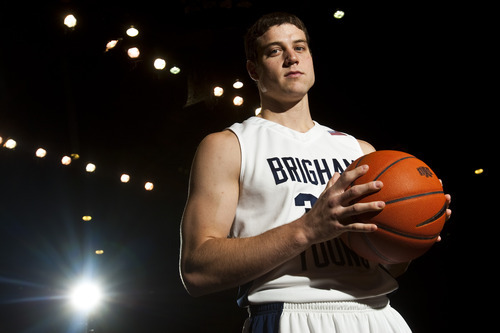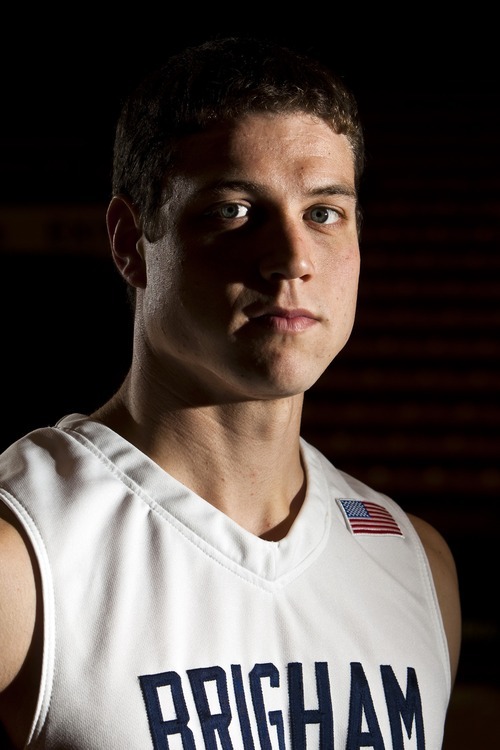This is an archived article that was published on sltrib.com in 2011, and information in the article may be outdated. It is provided only for personal research purposes and may not be reprinted.
Jimmer Fredette can ignite a scoreboard and change a game with the simple flick of his wrist. The former Brigham Young guard has star power and big-name marketing potential, despite being only 22 years old and not having played in the NBA. He is highly motivated and loaded with self-confidence. He is also humble and deferential, possessing a wealth of uncanny personal attributes that have already inspired a legion of devoted followers.
Wrap up Fredette's numerous assets and package them as the No. 12 pick in the 2011 NBA Draft, and a rebuilding Jazz franchise that unexpectedly stands at an uncomfortable crossroads would have everything it needs to take a huge step forward.
Whether Fredette is the next Stephen Curry or Adam Morrison is still to be determined. The Jazz will gain further insight Wednesday, when Fredette is scheduled to work out with former Connecticut standout Kemba Walker, among others.
But Fredette's selling power is undeniable. Just by calling out his name during draft night June 23 in Newark, N.J., the Jazz would instantly boost ticket sales and rekindle interest in a small-market franchise that no longer has Jerry Sloan and Deron Williams to sell. The organization could also crack a Utah County market it has long eyed, while directly connecting with a fickle, yet highly prized, youth demographic that sees Fredette as much as a pop star as a professional athlete.
Jimmer can shoot with the best, filling one of the Jazz's most glaring deficiencies. He can also sell the heck out of a jersey. Throw in his legendary run in Provo, and Jazz president Randy Rigby acknowledged that putting Fredette in a Jazz uniform could be a once-in-a-lifetime opportunity.
"There's no question that if the talent pick matches up with the local appeal of an athlete, you have an immediate marketing lift to help you," said Rigby, who believes Fredette transcends the normal divide that separates BYU and University of Utah fans.
"He's become kind of a favorite athlete for a lot of people in the state of Utah," Rigby said. "And so that interest, no question, would have some direct correlation and benefit for us from a revenue and sales [standpoint] and support from the fan base."
—
Perfect pick? • For the Jazz, selecting Fredette at No. 12 looks perfect on paper. Key Jazz personnel consider the 2011 draft to be the most important in the organization's history, and the franchise can satisfy its primary aspiration by going big and drafting Turkish center Enes Kanter at No. 3. The Jazz would then have the ability to select Fredette with the less-risky 12th pick, setting off a marketing bonanza by acquiring the most talented collegiate player to come out of the state in recent memory.
But the hope, excitement and energy represented by Fredette are weighed down by cold reality. The Jazz are ultimately trying to win games, not sell tickets. If Fredette's star crashes against the unforgivable hardwood of the NBA, national and regional critics will rejoice in ripping the Jazz to shreds. And for the few times that pro teams have gotten it right when opting for long-term success instead of short-term local appeal — Indiana drafting Reggie Miller at No. 11 in 1987 and passing on homegrown product Steve Alford tops the list — there are a multitude of franchises that have been lured in by inflated college statistics and burned by the appeal of a quick buck.
"Winning sells tickets," said ESPN NBA analyst Jeff Van Gundy, who pointed to the Jazz's selection of Hall of Famer John Stockton at No. 16 in the 1984 draft as proof that first-round selections can never be taken lightly.
"The Jazz fans are amongst the most loyal and the best in the league — and always have been," Van Gundy said. "The ownership and management have always put out a good product. … You never know when you're going to get a franchise player. You make the picks for all the right reasons. You try your best."
—
Exceeding expectations • Despite Fredette's vow to commit himself to the defensive end of the court and better-than-expected athletic measurements during the recent draft combine in Chicago, he is unlikely to become a franchise player. Analysts view him as an undersized combo guard whose pristine shooting touch is shadowed by a variety of limitations. Best case, Fredette's career ends up somewhere between former Cleveland sharpshooter Mark Price, Los Angeles Lakers guard Derek Fisher and Dallas speedster J.J. Barea.
But the addicting, curly-haired kid who Jimmered the NCAA last season as he carried the Cougars to the Sweet 16 could easily help lift a struggling organization. And his stock is clearly rising, as he's adhered to a carefully planned workout schedule, picking teams such as New York, Indiana, Sacramento and Phoenix that fit his playing style, then owning the court once he takes it. A month ago, Fredette was widely considered to be a mid- to late first-round pick during a weak draft. Now he could go as high as No. 7 to the small-market Kings and would be a strong selection by the Suns at No. 13.
Questions about Fredette's ability to not just play but succeed in the NBA are being erased before he's even played an official game. Now the main issue is whether he will still be on the board when the Jazz step up to the podium for the second time. And if Utah passes on Fredette and he continues to exceed expectations? The Jazz will have lost Sloan, Williams and the local legend known as Jimmer in less than one year.
"That's the plan: keep surprising people," Fredette said. "That's what, hopefully, I can do that for the rest of my career."
Twitter: @tribjazz —
Jimmer day
The Jazz are scheduled to work out Fredette, Kemba Walker (Connecticut), Josh Harrellson (Kentucky), Senario Hillman (Alabama), Malcolm Lee (UCLA) and Paul Carter (Chicago) on Wednesday. —
Who's getting Jimmer?
Sacramento (No. 7), Milwaukee (No. 10), Utah (No. 12) and Phoenix (No. 13) are the most likely options. But despite his rising draft stock, Fredette could also slide downward. The middle of the first round is loaded with forwards and international prospects, and teams could be hesitant to gamble on Jimmer — an undersized combo guard who is much more of a shooter than a passer. —
Think tank
The Jazz held a meeting Tuesday to discuss options for the 2011 NBA Draft. Pictures posted by chief executive officer Greg Miller (@GregInUtah) on Twitter showed owner Gail Miller, president Randy Rigby, general manager Kevin O'Connor, coach Tyrone Corbin, assistants Scott Layden and Jeff Hornacek, vice president of player personnel Walt Perrin and director of basketball operations Richard Smith in attendance.





